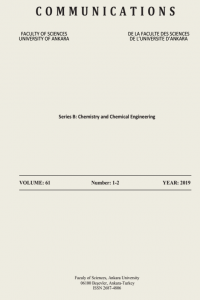THE EFFECT OF HYDROXYCARBOXYLIC ACIDS AND AMINO ACIDS ON THE CORROSION OF ALUMINIUM BASE ALLOYS IN 0.1 M NaCI SOLUTION
The effects of several hydroxycarboxylic acids, such as glycolic acid, lactic acid, mandelic acid, benzilic acid and several amino acids, such as glycine, alanine, valine, phenyl glycine, phenyl alanine and aspartic acid on the corrosion behaviour of aluminum-base alloys have been investigated in 0.1 M sodium chloride by the potentiodynamic-polarization technique. Hydroxy carboxylic acids accelerated the corrosion rate of aluminum and aluminum base alloys. The accelerating effects were explained by the formation of soluble complex ions. Corrosion currents found in amino acids containing sodium chloride solutions, were lower than corrosion currents found in hydroxycarboxylic acid containing sodium chloride solutions. This was explained by the adsorption of amino acids. It was found that some amino acids behaved as cathodic inhibitors and the inhibiting characteristics of amino acids were closely related to the electron densities of the functional groups at which adsorption occurred.
Keywords:
THE EFFECT, HYDROXYCARBOXYLIC ACIDS AMINO ACIDS,
___
- THE EFFECT OF HYDROXYCARBOXYLIC ACIDS AND AMINO ACIDS ON THE CORROSION OF ALUMINIUM BASE ALLOYS IN 0.1 M NaCI SOLUTION
- ISSN: 1303-6017
- Başlangıç: 1948
- Yayıncı: Ankara Üniversitesi
